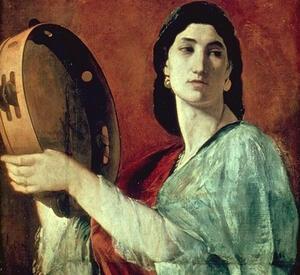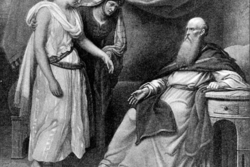The Forgotten Sister: Miriam
Passover is one of my favorite holidays. Delicious smells and familiar sounds fill the air as my mom sets the table and my family gathers for the Seder. We dip parsley in the salt water, remembering the tears of the Egyptians and Jews alike. We relax in our chairs and eat charoset, thinking of the mortar Jews were forced to use while laboring. While I find the story of Passover inspiring, every year I feel it’s missing something: a strong female lead.
In my experience, when we tell the story of Passover, the hero is always Moses–a classic overbearing male character. Somehow, we ignore the fact that Moses wouldn’t even be alive to save the Jewish people from slavery if it weren’t for his sister Miriam.
Miriam is one of many strong women described in the Jewish texts, and is far too often forgotten when we retell our stories. Two stories stand out to me in illustrating that Miriam is a truly wise and courageous woman: when Miriam saves her brother Moses in his youth, and when she leads the Jewish people in celebration after they successfully cross the Red Sea to safety.
Miriam finds her independence at a young age, defying both her parents, and choosing to spare her brother’s life all in one bold decision. Exodus describes a time when the Jewish people were enslaved in Egypt under the Pharaoh’s rule. One day the Pharaoh, fearing a Jewish uprising, ordered that all Jewish male babies be killed. Miriam’s father wanted to divorce her mother for fear of having another son, as was common at the time. However, Miriam interjected; she scolded them both, and said, “by separating, you are decreeing death on both the sons and daughters of Israel!” After her brother’s birth, Miriam devised a way to keep Moses alive: she placed him in a woven basket on the Nile River, and he is soon found by the Pharaoh’s daughter, and raised as royalty.
In another instance of bold leadership, after the Jews escape the oppressive Pharaoh’s rule by miraculously crossing the Red Sea, Miriam leads the entire Jewish community in celebration with her famous Song of the Sea. In Exodus 15:20-21, Miriam takes a “timbrel in her hand” and “chanted for them.” As the story continues, all the women join Miriam, singing in unison: “Sing for the Lord, for He has triumphed gloriously; Horse and driver He has hurled us into the sea.” This instance of female leadership in song is significant because only ten songs are mentioned in the entire Torah. Melody and verse are often interpreted as an expressive form of prayer, so it is especially important that a woman is leading the Jews in song. During the time of Exodus, it was very uncommon for women to lead prayer in any form.
Raised as a Reform Jew, I’ve been surrounded by strong Jewish women, both in Jewish texts and in my life. For instance, my mother is fierce and fearless; she doesn’t let anyone push her around. My mom and I are very close, and I felt a special connection with her when we stood together in the mikveh bath. The fact that my mom converted from Catholicism doesn’t take away from her serving as a Jewish woman role model for me. Instead, I see the strengths that come with it: my mother’s new commitment to Judaism, to raising me as a Jew, and to our family. She is one of the most important people in my life, and I see similarities between her strength–along with that of other Jewish women in my life–and the strength of those in the texts, songs, and hymns we study every day.
Throughout my life I’ve strived to embrace the same independent spirit as Miriam and my mom, to have the strength to be different and do what I know is right. Being an outspoken feminist in an increasingly polarized and hate-filled world is one example, and certainly no easy feat. Committing to sharing my voice on a large platform is another way in which I’ve claimed my place as a strong Jewish woman. But, throughout it all, I’ve known that I can do it. Deep down I know that I come from a long line of strong women–women who get things done; women who aren’t afraid to step out of their comfort zones to stand up for what they believe in. Whether that is leading a song on the edge of the sea, or blogging about abortion rights, Jewish women stand strong together. I now recognize my place in the line of Jewish women, and the strength that comes with it.
This piece was written as part of JWA’s Rising Voices Fellowship.







